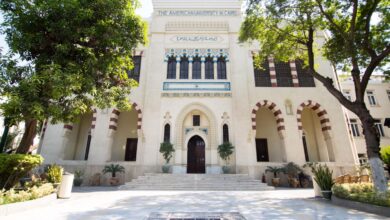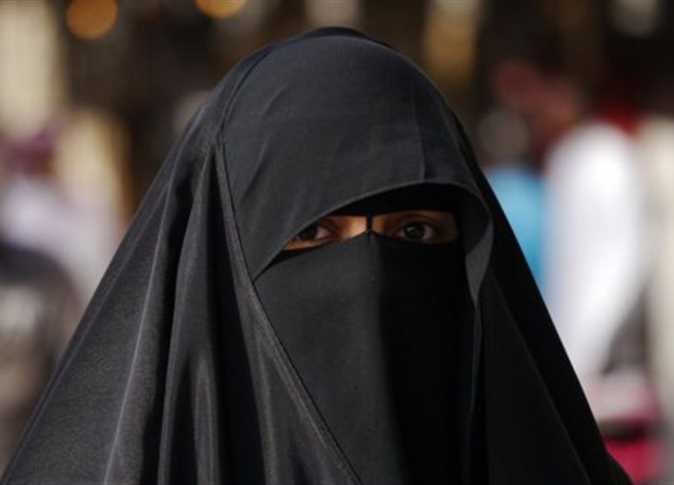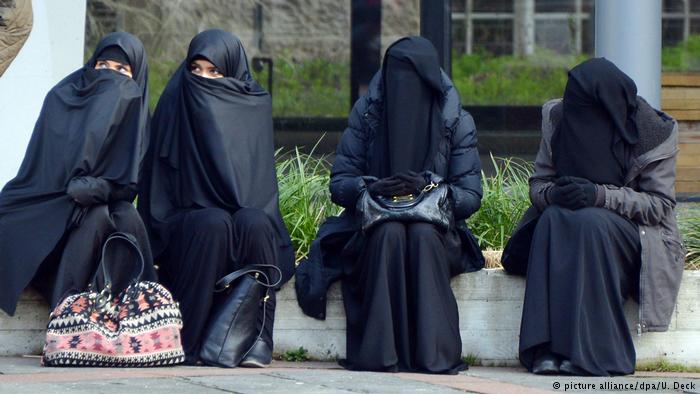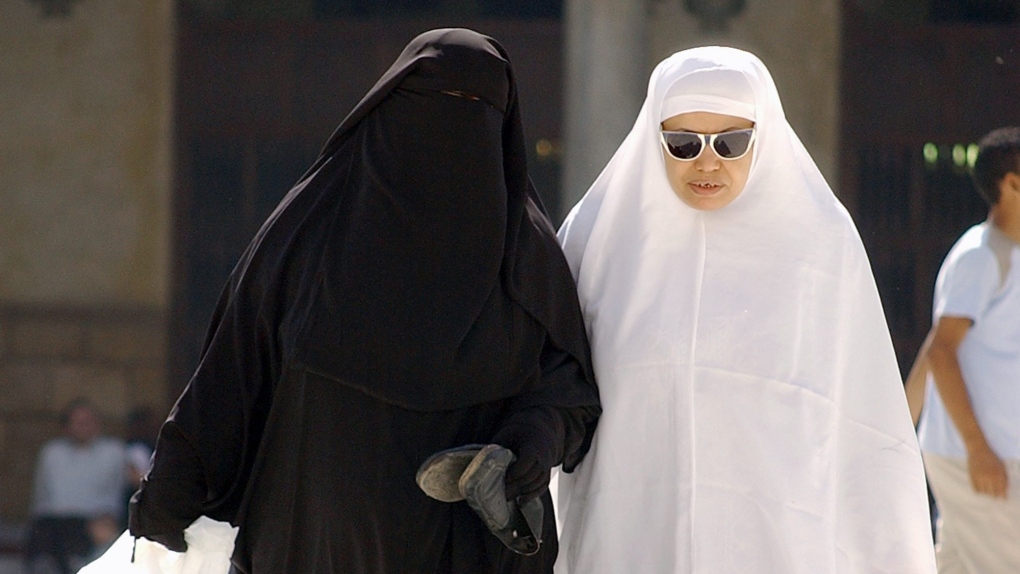When 31-year-old Aisha al-Shabrawy first wore the niqab, it was like someone had turned off the spotlight on her. Her full black veil and clothing made her feel invisible, a feeling she craved deeply as an outgoing student at the American University in Cairo who had become disenchanted with her superficial lifestyle.
Salafism brought her not only the spiritual connection that she craved, but a simplistic lifestyle unobstructed by material possessions.
"Salafis live purely to please God," she explains. "They are not concerned with this life and its distractions as much as they want to serve God for the afterlife."
Today, Aisha considers herself an ex-Salafi. Having been introduced to the tight-knit Salafi community on the AUC campus, she and two other former Salafis now look back on her experience with a bittersweet aftertaste.
By her definition, Salafis are Sunni Muslims who believe in the Prophet Mohamed, his followers and the four Imams. So by default, all Muslims, including Sufis and the Muslim Brotherhood, are Salafis — however, outsiders often view Salafis as ultraconservatives.
Initially, Aisha says she embraced wearing the niqab and found solace in her spiritual connection and in her close bond with fellow AUC Salafis.
"Yes, I was missing out on my old life, but I was enjoying my new life as well," she says. "The spiritual connection was really gratifying."
Her friend Radwa Aboul Azm, 29, also sought refuge in Salafism as an AUC freshman. A veiled graduate of an all-girls French school, she was intimidated by the social network of the AUC campus with its cliques and social codes. Her newfound Salafi community gave her the sense of belonging that she craved as well as a unique identity.
"I was young and I wanted to be different," she says. "And we were very distinct on campus."
Like Aisha and Radwa, 31-year-old Karim Ahmed* was introduced to Salafism during his freshman year at a private, affluent university.
"I was 17 when I got involved," he says. "I was very young and impressionable at the time."
Karim had embarked on a more religious phase after cutting ties with his former life of drug abuse. A chance conversation with a Salafi friend led him to become completely entrenched in the Salafi community within months. Although he had never consciously decided to embrace Salafism, he became a Salafi by association: His whole social circle consisted of young, affluent Salafis and he began hosting lectures by esteemed Salafi preachers and sheikhs at his home.
A secluded community
Karim, Aisha and Radwa were — in their own words — part of a privileged, elite segment of the Salafi community in Cairo, where young men like Karim would attend lectures by Mohamed Hussein Yacoub and Mohamed Hassan, and young women like Radwa and Aisha could embrace staying at home because their families could afford to support them.
"We were very privileged," says Aisha. "You have to differentiate between our segment and the greater population of Salafis who have to work to survive. I had the privilege of staying at home and having my father and ex-husband spend money on me."
The Salafi and Muslim Brotherhood communities on campus were like microcosms of the political parties today: Separate and glaringly wary of each other, the two circles did not mingle and operated differently.
The realization that these communities were cliques shattered Aisha’s romanticized hopes for a Muslim unity, while Radwa felt equally betrayed when the charity club she had joined turned out to be operated by the Brotherhood.
"I thought I was doing charity; no one had told me that the club had political affiliations," she says.
While Brotherhood groups managed community work and advocated academic excellence, the Salafi community at AUC focused more on attending religious lectures and keeping to themselves, even at the cost of academic failure.
"Just like the kids who skive off class to smoke, I just wanted to hang out with my friends instead of going to class," says Radwa. "So my religiousness affected me negatively."
Aisha and Radwa were part of this secluded community for years. Wearing the niqab was an easy decision because everyone in their community was dressed the same.
"In a way you become brainwashed, and you don’t question these rules," says Radwa. "We were very young and lived in a bubble. We didn’t see the bigger picture."
They became assimilated into a life of prayer, religious lectures and segregated socializing, where all forms of worldly temptations were denied.
"Our actions were propelled by fear," says Radwa. "You listen to the sheikhs preaching about death, hell and torture, and this terrorizes you instead of comforting you."
The two were introduced to eligible husbands through married female friends. They met with suitors under chaperonage and discussed their potential marriages from the first meeting.
"Back then, the perfect man was estimated by the length of his beard," Aisha says. "It wasn’t driven by sexual attraction. Our definition of a masculine man was one who is pious and devout, which you could estimate by the length of his beard. So a man without a beard is not manly."
To remain on a path of purity and piety, Salafis must avoid temptations such as hotels with liquor [meaning all hotels in Cairo, except for the former Grand Hyatt and Om Kalthoum Hotel], perfume, weddings, taxis, music, non-religious TV channels, taking photographs, being photographed and mingling with the opposite sex. Several of their Salafi friends had cut ties with their parents or siblings for condoning these temptations or criticizing their decision to wear the niqab.
Aisha didn’t agree with these restrictions.
"I wasn’t as much a moderate Salafi as I was a bad Salafi," she says. "They saw that my worldly desires overrode my duty toward my God. But I wasn’t convinced with a lot of their theories and I couldn’t find evidence to back up their arguments. So I left Salafism eventually."
Karim said that Salafis alienate others who are less religious with their knowledge of Islam, and that they implement Islam exactly as it’s written, "the way it should be." He said that while they can be rigid at times, not all Salafis are extremists.
All three insist that Salafis seen in the media and in politics do not accurately depict the Salafi community, and focus on extremists. They are baffled by Salafi figures who have made outrageous claims — for example, that a woman’s voice is sinful, that English should be banned in schools, or that a father and daughter should not be left alone in a room.
"Just because he’s a Salafi speaking on TV doesn’t mean you should believe it or implement it," Karim says. "Salafis believe that you can question and debate anyone except the Prophet Mohamed, so even though you’re supposed to follow scholars like Mohamed Hassan, if they say something stupid like this, you should reject it. Logically."
Forging a political role
A combination of widespread ignorance about Salafism and the media’s fear-mongering has led to — in their opinion — an unreasonable state of panic over Salafism’s rise. They say Salafis should be accepted into society instead of being ostracized.
"This is democracy," says Radwa. "Before, our enemy was the [formerly ruling] NDP and the political monopoly and oppression, but now that Salafis are in the public arena and in politics, we should accept this as a normal democratic development."
Aisha agrees. She says Salafis existed under oppression for years, and now they want a space in society.
"Their goal isn’t to shut down beaches or ban alcohol, but they want to make sure that there are options that are appropriate for them too. You cannot ask them not to live their lives or force them to change their beliefs, when you yourself don’t want them to change yours."
Karim says he believes Salafis are living the correct Muslim way, but he would vote for the Muslim Brotherhood because he doesn’t think Salafis are ready for politics yet, because their lives have so far been consumed by teaching religion. But he thinks an eventual transition to a Salafi president and government would be the best thing for Egypt, and would help restore the country’s dignity and rectify relations with the Arab world.
Radwa says Salafis’ tendency to be frank and straightforward works against them in politics.
"They’re not politically astute," she says. "A Brotherhood MP would not stand up to make the call to prayer in Parliament, but a Salafi did because he felt he had to please God regardless of who he angered. A Brotherhood politician would know how to play it right."
To Aisha, this is yet another incident that proves Salafis’ fixation on the little details.
"They read too much between the lines," she says. "Islam is a lot simpler than that."
She says she hopes Salafis in the future will opt for a middle ground.
"Islam is a loving, forgiving religion, but Salafis are more driven by fear and guilt than anything else," says Aisha. "I hope eventually they will realize that there is a need for a middle ground instead of ‘Our way or the highway.’ I don’t believe anyone should impose anything on anyone."
Karim said he didn't agree with Salafis' self-righteousness.
"They believe that theirs is the right path and everyone else is wrong. You can’t really say that the Salafi is right, or the Brotherhood is right, and everyone else isn’t. Islam is bigger than that."
Leaving the community
Today, while all three have left the Salafi community, they feel uncomfortable with religious labeling. Karim says there’s no such thing as a Salafi — "it’s all the same religion and everyone should learn from each other."
The disintegration of Aisha’s marriage to a fellow Salafi led her to re-evaluate her life in the community.
"A woman is not meant to work, she’s meant to get married, have kids and raise them on the Salafi tradition and be good to her husband," she says. "I didn’t feel comfortable anymore in this context and I knew I’d be repeating the same cycle if I stayed."
One day on campus, Radwa was summoned to meet the head of security, who informed her that she and her friends were under close surveillance, and he advised her to stay away for her own safety. When most of her Salafi friends graduated, she found herself alone and lonely, without her tight social network. A bout of depression led her to eventually take off the niqab.
Today, she says remains on good terms with her former "sisters in religion" despite their differences.
"I don’t regret my experience," she says. "I was lucky to meet people who taught me how to pray. I could have gone down a different, more self-destructive path."
Karim blames his young age and his relapse back into his old social life for leaving his Salafi circle.
"I miss the incredible spiritual bond you gain," he says. "Salafis don’t want the world; they have God and they feel safe knowing that. When you taste spirituality it’s very hard to forget it."
Radwa says Salafis have an incredible sense of solidarity and community.
"They are very involved in charity, and have impeccable moral values. They’ve done so much work in building hospitals and helping the poor; it’s no wonder so many love them and support them," she says.
For Aisha, the sisterhood bond she felt as part of the community is an ideal.
"You share an unbreakable bond with your sisters," says Aisha. "The problem is that you have this bond within the community and everyone else is an outsider. I wish this bond could expand to all of Egypt. That would be the perfect scenario."
*Karim’s name has been changed for the story at his request.
Correction: A previous version of this story misstated Aisha al-Shabrawy's age. It also misquoted her as referring to her husband, not her ex-husband, and misstated the name of Mohamed Hussein Yacoub.




